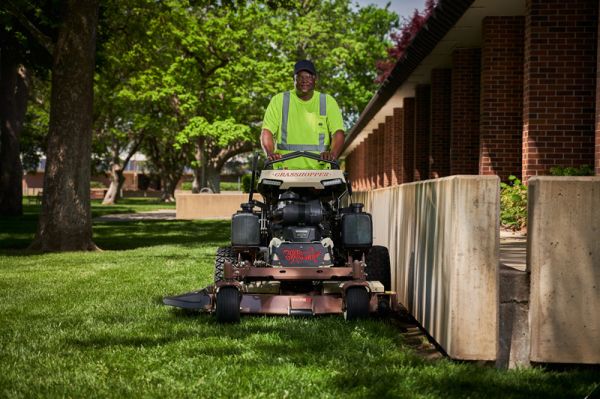Transitional tips: Making the move from residential to commercial with your landscaping business
Posted on:Apr 3, 2023

As a landscape business owner, assessing your client base on a regular basis is a good practice.
You want to prepare for changes in market conditions or client behavior so you can quickly adapt and ensure you have consistent work.
One way to shield your business against shifts in customer budgets or service needs is by expanding your client base.
Many landscape business owners start by offering their maintenance services to residential customers. This is an easy-entry option. Properties are smaller in size, your customers’ needs are clear, and you can complete the work solo or with a small team with limited equipment.
But as you grow, the allure of higher revenue and larger properties can become appealing.
Enter commercial landscape maintenance. Exploring this option can mean increased chances of repeat business and better marketing opportunities.
Let’s explore some necessary steps you need to take as a landscape professional to break into commercial work and expand your client portfolio and profit potential.
Three Ways To Expand Your Business Into Commercial Maintenance
Transitioning into the commercial landscape market can be challenging. You must change the way you market, manage, and perform your work to ensure success.
These three strategies can help you make a more seamless switch.
1. Understand Point-of-Contact Differences Between Residential And Commercial Customers and Adapt Accordingly
With residential work, you’re usually dealing with the homeowner, but with commercial work you are contacting a property or facility manager.
There are pros and cons to each scenario, according to Chris Shipp, owner of Shipp Shape Lawn Service in Sylvester, Georgia.
Well known in his small, local community, Shipp built his business with residential customers and added his first commercial property in 1999––a peanut roasting facility. Then, he added local municipal work and a 65-acre cemetery to his client roster. His business started at 75% to 80% residential and has become 60% commercial.
While residential customers will usually compliment your work right away, commercial clients expect high-quality work and it won't always come with accolades. “Commercial clients will be firm but they are also flexible,” Shipp said. “The contract spells out what is expected from week to week and month to month, and you can’t let them down.”
His commercial clients range from city medians and cemeteries to dentists’ and doctors’ offices, fast food chains, retail facilities, and restaurants.
Shipp maintains community relationships and involvement as part of the local chamber of commerce and serving on the local hospital board. This also helps him recruit labor.
This constant visibility in the community is what helps him grow his commercial work, but also helps keep quality in check. When all eyes are on you, you have to ensure clean maintenance, professional-looking crews and equipment, weed-free landscapes, and timely work.
Since his work is so visible in the neighborhood, Shipp makes sure his trucks are clean with company logos and contact information clearly printed on them, and his employees wear clean shirts and khaki pants.
2. Obtain Necessary Liability Coverage For Your Commercial Clients
While commercial clients have consistent budgets, which means consistent business, you have to think about the other necessary costs of adding this client base.
Building relationships locally and meeting customer needs is what has helped Shipp maintain his strong commercial client base without having to do bid work. To perform commercial work, you need to meet client expectations, and that includes liability coverage.
Residential work doesn’t require the amount of liability that commercial clients demand.
When Shipp first started, some smaller commercial clients required at least $10,000 in liability insurance. But bigger commercial clients like national chains, including Lowe’s, Home Depot, and Walmart require you to have more––upward of $100,000 or $500,000 or more.
These clients will require certificates of insurance before they award you landscape maintenance contracts.
3. Consider Opting For Diesel To Mow Large Commercial Properties To Save Money And Simplify Maintenance
The Grasshopper mowers Shipp uses––including 72-inch 900D 1.3 liter FrontMount™ mowers and 325D MidMount™ mowers––are diesel-powered machines. Making this switch was an important part of adding commercial work to his services.
“I got more mowing time per gallon going diesel over gasoline,” said Shipp. “It was instant savings.” When he first switched from gasoline to diesel, the cost difference was $.88 for diesel versus $1.25 for gas. While the savings aren’t as great today, the ease of maintenance on these machines still saves him money.
To perform other necessary work on his commercial clients’ sites, he uses attachments, such as a shielded sprayer, a PTO-driven AERA-vator™, PTO-driven CleanSweep™ Rotary Brooms, and PowerVac™ Collection Systems for both MidMount and FrontMount mowers. Blowing off commercial walkways and entryways after mowing ensures a clean site for everyone using those properties. This is a standard that commercial facility managers expect.
Ready To Go Commercial?
Now that you know some of the essential tips involved in expanding into commercial landscape maintenance, it’s time to start.
Once you get your first client, remember to keep things varied to ensure you’re not too dependent on one type of account. A good mix of property types helps diversify your commercial service offerings and builds community relationships.
And if you need larger mowers to help you do the work on these bigger properties, Grasshopper can simplify your search with reliable options that can suit a variety of property sizes and maintenance needs. Give one of our local dealers a call to find the best machines for your business.

